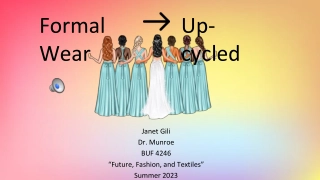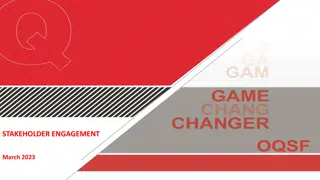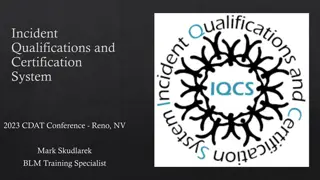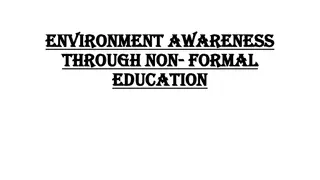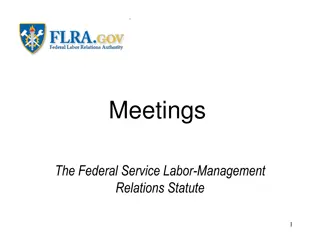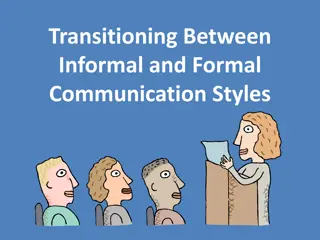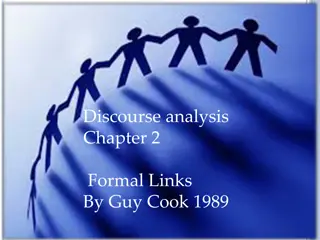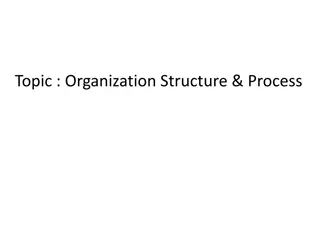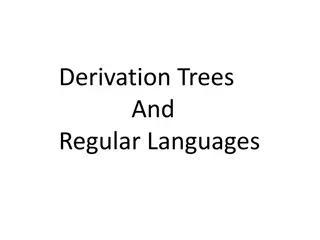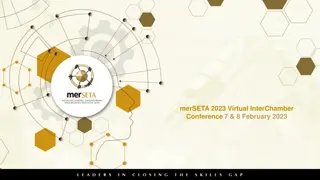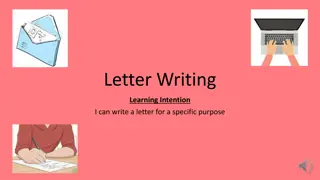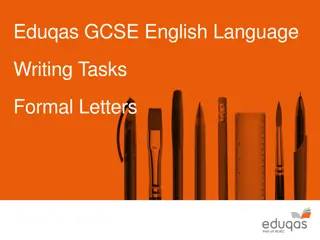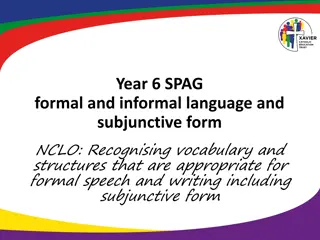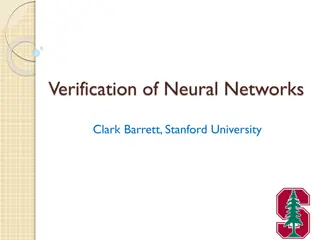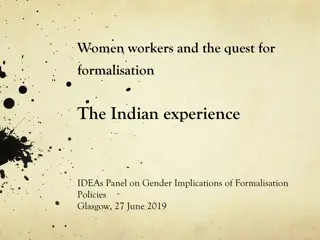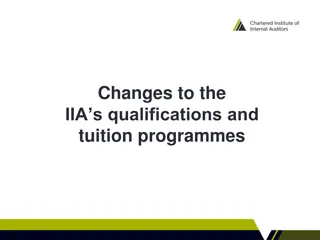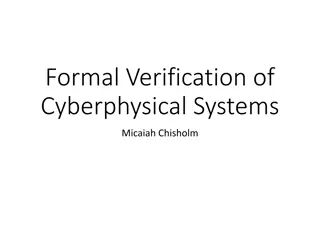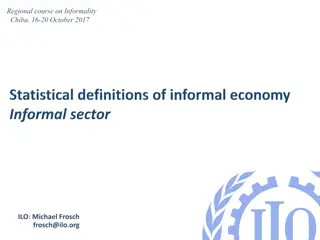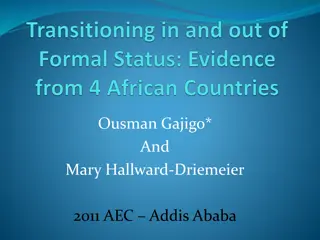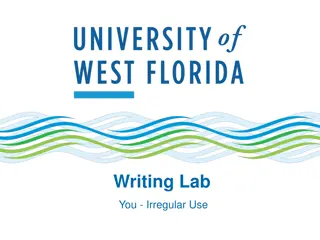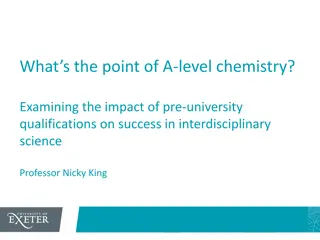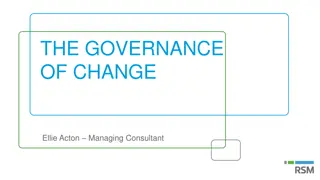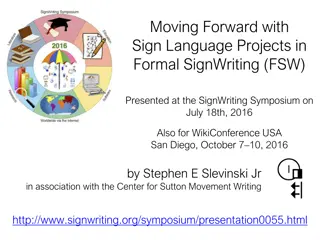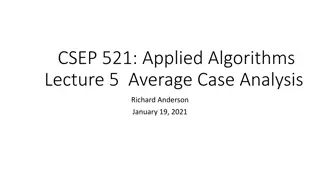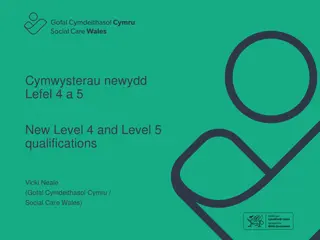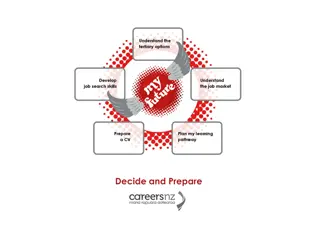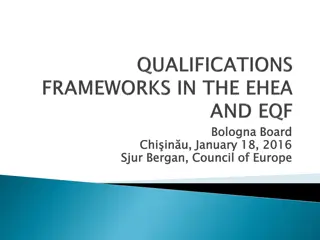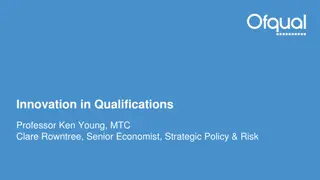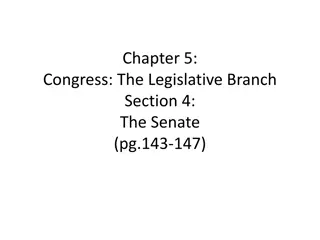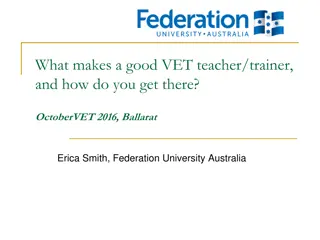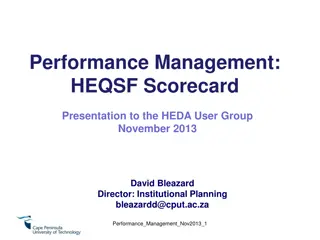Sustainable Fashion Solutions for Repurposing Formal Wear
Transforming formal wear from single-use items into sustainable fashion solutions is vital for reducing textile waste and environmental impact. This article explores the challenges of post-party formal dresses, the environmental consequences of textile waste, and innovative approaches to upcycling d
9 views • 14 slides
National Qualifications Framework and Accreditation Process Overview
This content provides an in-depth look at the National Qualifications Framework (NQF) including various qualification types and levels. It also delves into the Accreditation Process for occupational qualifications, challenges faced, stakeholder engagement, and the stages applicants go through when s
2 views • 18 slides
IQCS and Incident Qualifications: Enhancing Certification Systems
The Incident Qualifications and Certification System (IQCS) plays a crucial role in the training and certification of responders in various agencies and organizations. Started in 2004, IQCS has evolved to include interagency cooperation and standardized course delivery. The system ensures that respo
2 views • 20 slides
Mastering Formal Letter Writing in Education
Enhance your formal letter writing skills in education with a focus on job applications and key features of formal correspondence. Explore the purposes of writing letters and learn to choose the appropriate writing style for each type. Practice completing expressions for formal letters effectively.
5 views • 27 slides
Governance and Managerial Leadership of Formal Social Protection in Africa: Insights from Cameroon's National Social Insurance Fund (CNPS)
This presentation delves into the governance and managerial leadership of formal social protection in Africa, focusing on Cameroon's CNPS system. It discusses the institutional evolution of social protection, the challenges faced by bureaucratic and political stakeholders, and the roles of various s
0 views • 8 slides
Enhancing Environmental Awareness Through Non-Formal Education Initiatives
Non-formal education plays a crucial role in enhancing environmental awareness through programs such as eco-clubs, population education initiatives, and the National Green Corps. These initiatives aim to educate individuals, especially children, about environmental issues, leading to better decision
0 views • 7 slides
Understanding Formality in Meetings under the Federal Service Labor-Management Relations Statute
The Federal Service Labor-Management Relations Statute provides guidelines for formal discussions and investigative examinations in the context of labor relations. It outlines the rights of unions to representation in formal meetings, emphasizing the importance of subject matter and formality. The d
0 views • 34 slides
Mastering Communication Styles: Informal vs. Formal
Explore the nuances of transitioning between informal and formal communication styles, understand the components of different forms of communication, and learn when to apply each style in appropriate situations. Delve into the characteristics and examples of informal and formal communication, and di
0 views • 18 slides
Understanding Discourse Analysis: Formal Links and Contextual Connections
Discourse analysis involves examining language beyond grammar rules, focusing on formal links within sentences and contextual connections outside of language. Guy Cook discusses how formal features shape discourse meaning and how verb forms influence sentence coherence. The use of parallelism in spe
3 views • 22 slides
Understanding Organization Structure and Process
Organization structure is the formal arrangement of relationships within a firm, important for achieving objectives efficiently. It involves elements like job differentiation, integration, authority systems, and flow of information. The formal and informal organizational structures play distinct rol
5 views • 62 slides
Understanding Formal and Informal Writing Styles: A Guide for Year 5 Students
Explore the concepts of formal and informal writing styles through engaging activities and examples in this educational resource tailored for Year 5 English students. Learn to distinguish between the two styles, understand the criteria for each, and practice transforming sentences from informal to f
1 views • 18 slides
Understanding Derivation Trees and Regular Languages in Formal Language Theory
Derivation trees play a crucial role in formal language theory, aiding in visualizing the process of deriving strings from a formal grammar. The concept of leftmost and rightmost derivations, along with their respective tree representations, provide insights into how strings are generated using gram
1 views • 15 slides
merSETA 2023 Virtual InterChamber Conference Overview
In the merSETA 2023 Virtual InterChamber Conference, key focus areas included the status of occupational qualifications development, learning material development, and implementation challenges and successes. Notably, progress was made in aligning qualifications, re-submitting qualifications for reg
1 views • 9 slides
Learning to Write a Formal Letter of Complaint
Explore the process of writing a formal letter of complaint with the help of visual aids and an example scenario. Learn about the structure and key components of such letters, including addressing the issue, expressing concerns, and requesting resolution. Enhance your letter-writing skills by unders
2 views • 15 slides
Mastering Formal Letter Writing: Tips and Examples for Success
Explore the art of formal letter writing with this comprehensive presentation covering the fundamentals of planning, content, features, and layout. Learn how to address the audience, define the purpose, structure your letter effectively, and craft the right tone. Discover essential tips for opening
0 views • 22 slides
Automatic Recognition of Higher Education Qualifications Treaty Summary
Importance of automatic recognition of qualifications in higher education has been emphasized, leading to initiatives like the Treaty on Automatic Recognition of Higher Education Qualifications by Baltic and Benelux states. This treaty aims to enhance mutual trust, transparent recognition, and contr
1 views • 8 slides
ABSA Submission on National Qualifications Framework Amendment Bill
ABSA presented a submission on the National Qualifications Framework Amendment Bill regarding key matters such as processing times for qualification checks, third-party suppliers, and notification of fraudulent results. They expressed concerns about the verification process timelines and the impact
0 views • 6 slides
Understanding Formal Invitation Card Etiquette
Formal invitations play a significant role in conveying important event details and setting the tone for the occasion. They provide complete information including the occasion, names of hosts and invitees, date, time, venue, and more. The format of formal invitations follows specific guidelines, usi
0 views • 16 slides
Exploring Orto-Computing: Bridging the Gap Between Formal and Phenomenological Computing
Meaningful experiments suggest a transition from the formal, Turing-based approach to a structural-phenomenological one called Orto-Computing. This innovative concept integrates mind-matter interaction and non-formal functions within computational systems, offering potential solutions to complexity
0 views • 18 slides
Understanding Formal and Informal Language with Subjunctive Form
Explore the distinctions between formal and informal language, along with the appropriate usage of the subjunctive form. Learn how to enhance your writing by identifying key vocabulary and structures for formal speech and writing. Get insights on recognizing and utilizing formal language in various
0 views • 9 slides
Software Bugs and Formal Verification in Critical Systems
Software bugs have caused catastrophic events like radiation overdoses and rocket explosions, emphasizing the importance of formal verification in ensuring software correctness. Formal verification uses mathematical models to prove software correctness, offering higher assurance, especially in safet
1 views • 26 slides
Challenges and Policies in Formalising Women Workers in India
The Indian labor market faces significant challenges in formalizing women workers, with a noticeable decline in women's employment especially in rural areas. Despite recent policy attempts at formalization, such as the Unorganized Workers Social Security Act 2008 and the Maternity Benefits Act, wome
0 views • 19 slides
Changes to IIA Qualifications and Tuition Programmes
The International Internal Auditors (IIA) is making changes to its qualifications and tuition programmes, phasing out the IIA Diploma and introducing the Certified Internal Auditor (CIA) and Qualification in Internal Audit Leadership (QIAL). Transition arrangements are in place for current students,
1 views • 14 slides
Formal Verification of Cyberphysical Systems and Future Certification Methods
Explore the formal verification techniques and tools used in cyberphysical systems, including KeYMaera verification tool, applications in distributed car control and adaptive cruise control, and the formal verification of ACC algorithms. The future work section highlights considerations for sensor d
0 views • 17 slides
Understanding the Transition to Formal Economy: Concepts and Recommendations
The concept of the informal economy, formal arrangements, and the distinction between informal sector and informal employment are explained in detail. Recommendations and resolutions from ILO concerning the transition from informal to formal economy, statistical guidelines, and definitions are highl
0 views • 26 slides
Determinants of Formality and Informality in African Firms
This research explores the factors influencing the formal registration of firms in African countries and the impact of transitioning between formal and informal sectors. It delves into the effects on firm performance, access to infrastructure and finance, tax revenue, and worker welfare. The study a
0 views • 20 slides
Effective Use of "You" in Writing: Informal vs. Formal Guidelines
Understanding the usage of the second-person pronoun "you" in writing is essential for clear communication. In informal settings, "you" is used broadly to address readers directly or as an indefinite pronoun. However, in formal writing, it's crucial to avoid potential reader bias by using alternativ
0 views • 4 slides
Impact of Pre-University Qualifications on Success in Science: A-Level Chemistry Study
Examining the influence of pre-university qualifications, particularly A-level Chemistry, on success in interdisciplinary science fields. The study explores the predictors of success, including the role of mathematics, across various science subjects and discusses the outcomes of students with and w
0 views • 10 slides
Understanding the Importance of Formal Governance in Project Management
Formal governance in project management is crucial for ensuring robust decision-making, optimizing project portfolios, improving relationships with stakeholders, minimizing risks, and maximizing benefits. By adopting a formal approach to governance, organizations can enhance project and program perf
0 views • 14 slides
Exploring Formal SignWriting in Sign Language Projects
Delve into the world of Formal SignWriting (FSW) as presented at the SignWriting Symposium in 2016 by Stephen E. Slevinski Jr. Discover how FSW, supported by the Center for Sutton Movement Writing, offers a formal language system for sign languages with stable standards and diverse implementations.
0 views • 29 slides
Guidelines for Writing Effective Formal Letters
Learn about the types of formal letters, elements of a successful letter, paragraph planning tips, and the style to use in formal letters. Understand how to structure letters of complaint effectively, including the importance of clarity, justification, and clear presentation of complaints and sugges
0 views • 15 slides
Understanding Average Case Analysis of Algorithms
Explore the average case performance of algorithms, focusing on topics like stable marriage, the coupon collector problem, and formal settings for random inputs. Learn about stable matching scenarios, formal notions, and examples illustrating the concepts. Discover the formal problem of matching pre
0 views • 29 slides
Qualification Framework in Social Care Wales
The Social Care Wales Qualification Framework outlines Level 4 and Level 5 qualifications in social care, focusing on professional practice, leadership, and management. It provides structured training and development routes, raising standards and skills in the sector. The framework includes mandator
0 views • 8 slides
Understanding Tertiary Education Options in New Zealand
Explore the various qualifications, completion times, and providers in New Zealand's tertiary education system. Learn about the different levels of qualifications available, typical study durations, and where you can obtain these qualifications. Gain insights into the meaning of study and training,
0 views • 23 slides
The Bologna Process: Enhancing Qualifications Frameworks in Higher Education
The Bologna Process, initiated in 1999, aimed to establish a harmonized system of higher education qualifications across Europe. Key developments included the introduction of a three-tier degree structure, emphasis on recognition and mobility, and the adoption of a Qualifications Framework in 2005.
0 views • 7 slides
Advancing Innovation in Qualifications: Challenges and Opportunities
Explore the journey towards innovation in qualifications led by Professor Ken Young, MTC Clare Rowntree, and other experts. Delve into the meaning of being capable, challenges faced, strategies for achieving innovation, and thought-provoking questions for discussion on the future of innovation in qu
0 views • 10 slides
Inside the Senate: Roles, Benefits, and Leadership
The Senate, known as the upper house of Congress, holds various privileges and benefits for its members, including a six-year term, substantial salary, tax deductions, and legal immunity during session. Senators are distinguished by formal qualifications such as age and citizenship status. Informal
0 views • 8 slides
Qualifications and Challenges of VET Teachers in Australia
Qualifications for VET teachers evolved from in-service degrees to Certificate IV level. Challenges include recruitment issues, lack of higher-level qualification evidence, and reluctance in supporting teacher qualifications by state governments and unions. Research aims to address quality problems
0 views • 32 slides
Understanding Qualifications for Church Leaders in Biblical Context
Exploring the biblical qualifications for church leaders outlined in 1 Timothy and Titus, emphasizing the importance of qualified leadership for the spiritual health and protection of the church. The background of these epistles and the differences in the churches they addressed provide insights int
0 views • 34 slides
CPUT Performance Management Scorecard for HEQSF Programme Development
CPUT is facing the challenge of aligning qualifications with the new HEQSF, requiring the development of about 200 new qualifications in the next five years. The Performance Management Scorecard is being used to track the progress of adapting qualifications to the HEQSF standards across different ca
0 views • 23 slides
